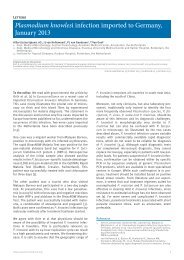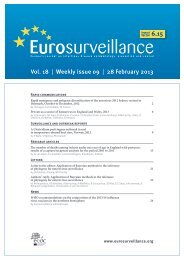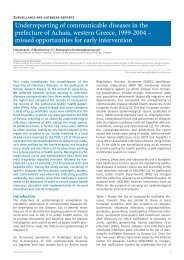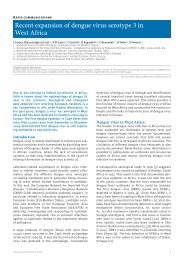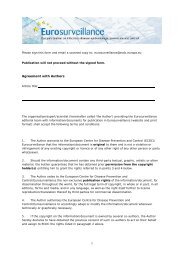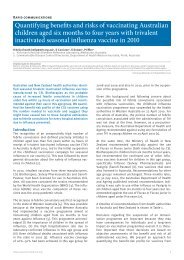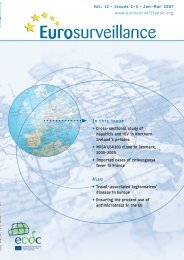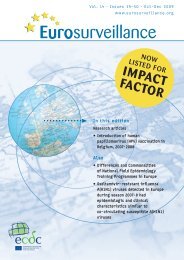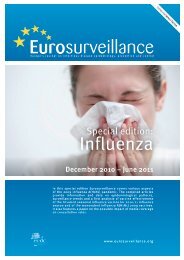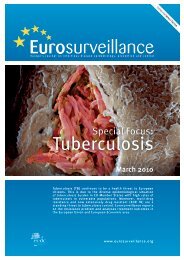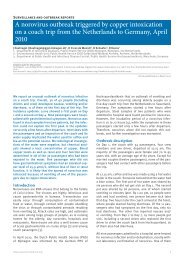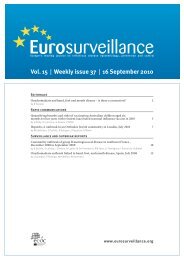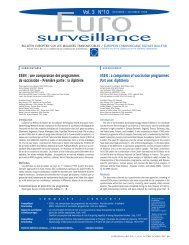Neisseria meningitidis - Eurosurveillance
Neisseria meningitidis - Eurosurveillance
Neisseria meningitidis - Eurosurveillance
You also want an ePaper? Increase the reach of your titles
YUMPU automatically turns print PDFs into web optimized ePapers that Google loves.
Perspectives<br />
The need for ethical reflection on the use of molecular<br />
microbial characterisation in outbreak management<br />
B Rump (BRump@ggdmn.nl) 1 , C Cornelis 2 , F Woonink 1 , M Verweij 2,3<br />
1. Municipal Health Service (GGD) Midden-Nederland, Zeist, the Netherlands<br />
2. Department of Philosophy, Utrecht University, Utrecht, the Netherlands<br />
3. Ethics Institute, Utrecht University, Utrecht, the Netherlands<br />
Citation style for this article:<br />
Rump B, Cornelis C, Woonink F, Verweij M. The need for ethical reflection on the use of molecular microbial characterisation in outbreak management. Euro Surveill.<br />
2013;18(4):pii=20384. Available online: http://www.eurosurveillance.org/ViewArticle.aspx?ArticleId=20384<br />
Current thinking on the development of molecular<br />
microbial characterisation techniques in public health<br />
focuses mainly on operational issues that need to be<br />
resolved before incorporation into daily practice can<br />
take place. Notwithstanding the importance of these<br />
operational challenges, it is also essential to formulate<br />
conditions under which such microbial characterisation<br />
methods can be used from an ethical perspective.<br />
The potential ability of molecular techniques to show<br />
relational patterns between individuals with more certainty<br />
brings a new sense of urgency to already difficult<br />
ethical issues associated with privacy, consent<br />
and a moral obligation to avoid spreading a disease.<br />
It is therefore important that professionals reflect on<br />
the ethical implications of using these techniques in<br />
outbreak management, in order to be able to formulate<br />
the conditions under which they may be applied in<br />
public health practice.<br />
Introduction<br />
Recent advances in molecular microbial characterisation<br />
open up new scientific opportunities for a better<br />
understanding of not only the pathogenicity, evolution<br />
and spread of human pathogens, but also the epidemiology<br />
of the diseases they cause. Such progress has<br />
promising prospects for infectious disease control,<br />
particularly for real-time source and contact tracing<br />
in outbreak management [1]. Current thinking on the<br />
development of molecular microbiology characterisation<br />
techniques in public health focuses predominantly<br />
on the operational issues that need to be resolved [1].<br />
The recommendations of the November 2011 expert<br />
consultation Breakthroughs in molecular epidemiology<br />
of human pathogens - how to translate breakthroughs<br />
into public health practice, organised by the European<br />
Centre for Disease Prevention and Control (ECDC),<br />
clearly outline the scientific hurdles that need to be<br />
overcome in order for public health to benefit from<br />
the recent scientific and technological advances in<br />
the rapidly evolving next generation sequencing technologies<br />
[1]. Despite the importance of these operational<br />
challenges, it is also essential to address the<br />
ethical difficulties associated with the use of microbial<br />
Article submitted on 20 June 2012 / published on 24 January 2013<br />
characterisation techniques in public health. The need<br />
for ethical guidance concerning the use of molecular<br />
typing methods is not new. Ethical challenges stemming<br />
from the introduction of molecular genomics have<br />
often been addressed in the context of populationlevel<br />
genomics and biobanking; such issues include<br />
those related to persons’ autonomy and the patient–<br />
healthcare professional relationship. The use of these<br />
techniques in infectious disease control now raises<br />
similar ethical issues, in which individual interests and<br />
individual needs must be weighed against those of the<br />
public at large [2]. Due to recent scientific and technological<br />
advances in molecular microbial characterisation,<br />
the need for ethical guidance has now gained a<br />
new sense of urgency [3].<br />
Although microbial characterisation techniques have<br />
primarily (and successfully) been used to benefit the<br />
general public’s health, the results can also be used<br />
for other purposes, notably in support of legal or moral<br />
claims about responsibility and liability. For example,<br />
in 2007, in the Netherlands, genetic sequence analysis<br />
of HIV strains was used in a criminal case, in which the<br />
plaintiffs, who were recently infected with HIV, accused<br />
the defendants of deliberately administering them a<br />
subcutaneous injection of HIV-positive blood. The comparison<br />
of the genetic sequence analysis of the HIV<br />
strains of both parties was used as legal evidence [4].<br />
Another example is a listeriosis outbreak linked to a<br />
food facility near Toronto, Canada, in 2008 [2]. Public<br />
health officials initially responded to the outbreak<br />
using traditional contact tracing and outbreak investigation.<br />
The food facility issued a voluntary recall of<br />
cold meat products before a confirmed linkage was<br />
available. Typing was used retrospectively to reduce<br />
uncertainty about the link between the 100 confirmed<br />
cases (23 deaths) and exposure to contaminated<br />
food from the facility. The resulting class-action lawsuits<br />
filed in four Canadian provinces were settled in<br />
December 2008 for US$ 27 million.<br />
106 www.eurosurveillance.org



